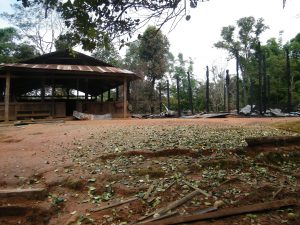In July 2011, almost exactly a year after the attack on Tha Dah Der, the UN Security Council adopted Resolution 1998 (SCR 1998), which requests the Secretary-General to include in its “list of shame” parties that engage, “in contravention of applicable international law, in recurrent attacks on schools and/or hospitals” or “in recurrent attacks or threats of attacks against protected persons in relation to schools and/or hospitals.” Partners in the field report that there is a lack of clarity regarding the scope of SCR 1998. Is its application limited to only “targeted attacks” that can be shown to have intentionally singled out a school and/ or a hospital?

What's left of a school building following an attack by Tatmadaw soldiers in the village of Tha Dah Der. Students haven't been able to go return to the building and have had to start going to a different school elsewhere.
This interpretation would exclude the attack on Tha Dah Der from being monitored under SCR 1998. The Tatmadaw units that attempted to burn the school did, after all, also burn the rest of the village; their intent was not to target the school – it was to target the whole community, including the school. To exclude such attacks from monitoring would run counter to the spirit of SCR 1998, which seeks to address “actions that impede children’s access to education and to health services”.When schools, clinics and children’s homes are burned, destroyed or otherwise made uninhabitable, when they are permanently or temporarily forced to close or when teachers and medics are forced to flee because they feel they will not be accorded even basic protection by armed forces or groups, children’s health and education are unacceptably disrupted. The decisive factor in whether to report attacks against health and education should not be whether an attack singled out medics and teachers or hospitals and schools, but whether, in the course of the attack, parties to conflict failed to respect their status as protected persons and places.
Click here to learn more about the legal analysis of SCR 1998 and how it may be impeding UN-led responses to attacks on health and education in eastern Burma.



